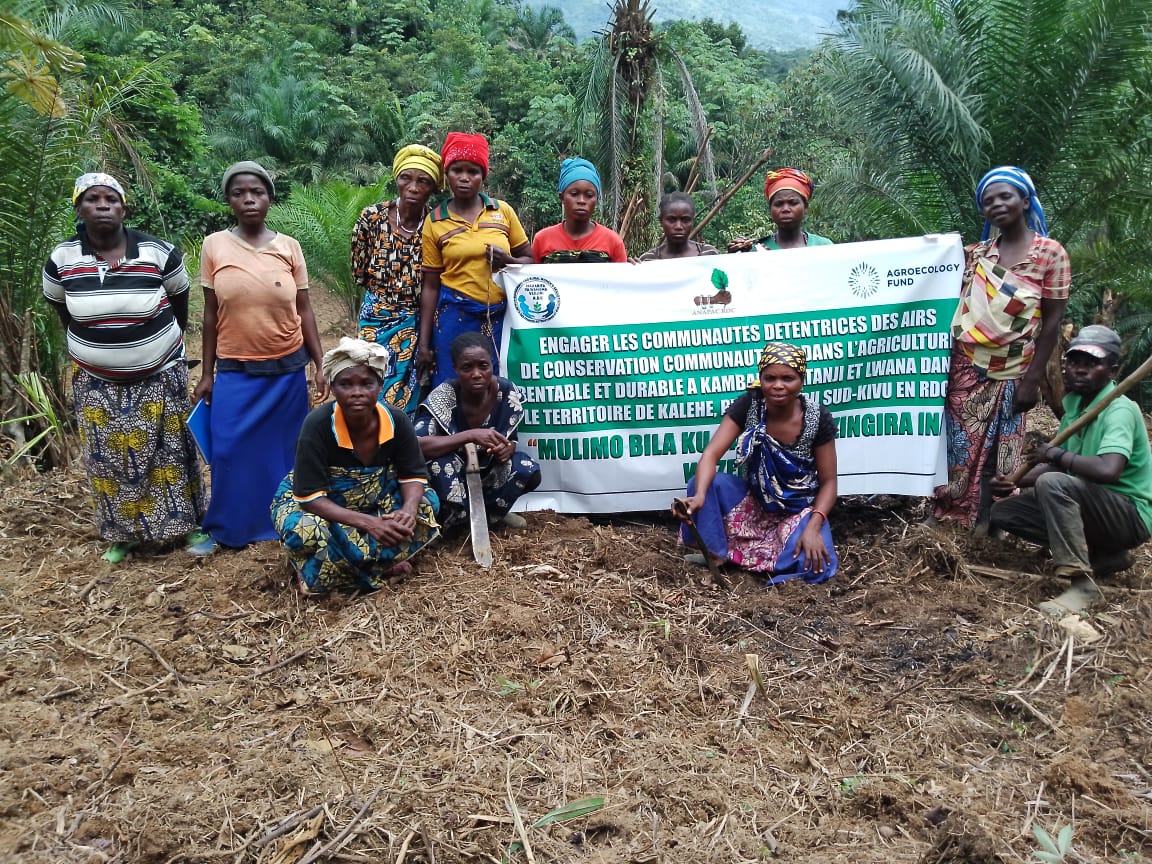The Democratic Republic of the Congo (DRC), like so many other countries in the world, struggles to protect its forests. The Congo rainforest is the world’s second largest, spanning six countries. Of these six countries, DRC contains the largest area of rainforest, with 107 million hectares, amounting to 60 percent of Central Africa’s lowland forest cover. These old-growth forests are essential carbon sinks and buffer this region and the world from the increasingly devastating climate crisis, just as they offer an agroecological food supply to communities that live in and around the forest. The Congo rainforest is also known for its high levels of biodiversity, with more than 600 tree species and 10,000 animal species, including critical habitat for primates. The communities and Indigenous peoples living in the Kivu region (Sud-Kivu and Maniema provinces), in proximity to the protected areas of eastern DRC, protect the forest and derive from it a traditional, wild food-based diet.
The Agroecology Fund, with funding support from Arcus Foundation, the David and Lucile Packard Foundation, Synchronicity Earth, and others, supports a collaborative initiative in the Congo Basin (CB) focused on the nexus of grassroots-led agroecology and rights-based, locally-led conservation. One of the collaboratives being implemented in DRC is led by Congo Basin Conservation Society (CBCS) network, and also includes the Association des Agriculteurs Sans Frontières (AASF) Bukavu, which is responsible for agroecological training; the Société Civile Environnementale et Agro Rurale du Congo (SOCEARUCO), which is responsible for educating policy makers in support of the agroecological transition in local and national policy decisions, and the Institut Supérieur de Développement Rural (ISDR)-Kindu, which is responsible for scientific research on forests. The primary goal of this work is to support community-led forest governance, conservation, and agroecology.
Over the past year, there has been great community momentum with this initiative, paving a path toward a future even more deeply rooted in agroecology. The work includes implementation of practical actions to strengthen food production for food security and access to markets, as well as campaigns to sensitize society and local political authorities to protect the forest. Following a campaign to raise awareness among local leaders in the forest areas, these local leaders took action to stop illegal logging.There has been an increase in entrepreneurship opportunities, especially for women, to boost the local economy while also fighting the impacts of severe drought due to climate change. However, the work is not without its challenges.
As Congo Basin Conservation Society (CBCS) prepares to participate in Cop 16 in Colombia to help track and guide implementation of National Biodiversity Strategies and Action Plans (NBSAPs) to align with the Kunming-Montreal Global Biodiversity Framework—which recommends conservation of forests up to 30% of the national territory— civil society activists in the DRC, who campaign day and night against the destruction of the country’s forests, continue to be threatened by logging companies. According to a 2022 government audit, industrial logging in Congo involves a lot of controversies with compliance of environmental regulation and violations of community rights and the license process is not transparent. In fact, the past six ministers of environment, the very people in charge of enforcing environmental regulations, are accused of illegally selling off huge swaths of it, according to the audit, which reviewed Congo’s industrial logging as of 2020.
In August 2020, Josue Aruna, Executive Director of CBCS, received an anonymous phone call threatening him and his family if he continued his environmental and human rights work. Now, in a recent incident, a network of illegal loggers are leveraging their strong economic position due to the exploitation of the forests to bring legal proceedings against environmental defender Yahya Mirambo—who is acting on behalf of the local community and in favor of the environment and the rights of the communities. These are just a couple of examples of ongoing threats to just land use and rights. A failure to defend these community rights in the DRC costs the planet dearly in terms of its overall impact on climate change and loss of biodiversity. It has serious consequences for the economy and lives of the Congolese people themselves, including their food security.
CBCS and civil society organizations denounce these threats and legal manipulations, which seek to discourage the important work of environmental and human rights defenders. CBCS seeks international solidarity to help stop this unjust persecution. As we head into global negotiations about biodiversity and forest conservation at COP16 in Colombia, we would be remiss to ignore the troubling situation in DRC, and in communities around the world, including in Colombia. According to the international nongovernmental organization Global Witness, Colombia is “the world’s deadliest country for land and environmental defenders.” The organization’s 2024 annual report, Missing Voices: The Violent Erasure of Land and Environmental Defenders, counts 79 murdered defenders in Colombia in 2023, 40 percent of all reported cases worldwide.
Many countries which are home to the forests we so badly need to conserve and restore, are also home to economies characterized by unsustainable extraction of natural resources. These perverse economic calculations and accompanying human rights abuses hurt both people and the planet. This is the time for COP16 and COP 29 conversations to insist on safeguarding rights of Indigenous and local communities. Climate philanthropy can connect the dots between climate, agroecology, Indigenous land rights, and community-led conservation. When we support organizations like CBCS and express zero tolerance for persecution of environmental defenders, we all win: Healthy forests, healthy food and life-affirming biodiversity.
